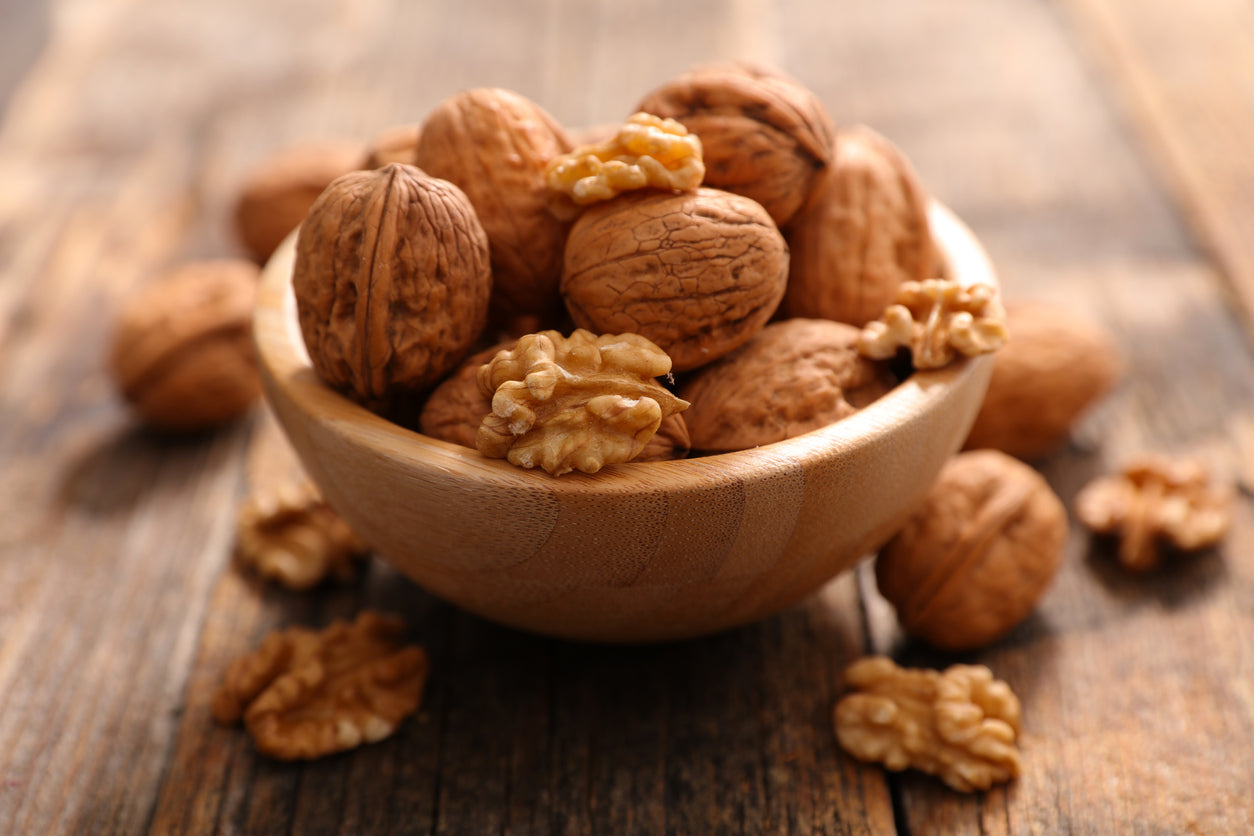Better appetite control and weight loss by simply going "nuts"

With their rich, buttery taste and crunchy consistency, walnuts make a delicious, satisfying snack. And their content of essential minerals, antioxidants and beneficial dietary fiber only adds to their list of virtues. Yet, due to perceived concern over walnuts’ caloric content and high level of fat, weight-conscious individuals may steer clear of this superfood.
And that’s a shame.
While it’s true walnuts are relatively high in fat, these fats are the “good” kind. (Yes, there is such a thing!) Scientists report that the omega-3 fatty acids in walnuts have anti-inflammatory and blood sugar-lowering effects. But, there’s yet another twist to the story. Recent studies show that moderate consumption of walnuts not only doesn’t contribute to weight gain - but can actually reduce appetite and promote weight loss.
Walnuts can help to support your weight loss goals
In a study published in 2017 in Diabetes, Obesity and Metabolism, researchers evaluated the effects of walnuts on appetite and hunger. The research was a crossover study – meaning that the same volunteers participated in both portions of the trial, switching back and forth from five walnut-free days to five days of supplementing their normal diet with walnut smoothies.
The study was placebo-controlled, meaning that the subjects had no way of knowing when - and if - they were receiving walnuts in their smoothies. And, the results were intriguing. The scientists found that daily consumption of walnuts decreased feelings of hunger, reduced appetite, and could lead to “beneficial metabolic effects” (in other words: weight loss).
It appears that the healthy amounts of fatty acids, protein and fiber in walnuts have the effect of blunting appetite, thereby setting the stage for weight loss. By the way, the team found that improved blood sugar control was also a “perk” of daily walnut consumption.
These results are supported by additional studies examining the effect of nuts in general on weight loss. In a study published in the American Journal of Clinical Nutrition, women who said they never ate nuts actually gained more weight over an eight-year period than those who reported eating nuts at least twice a week!
A healthy snack that promotes "good for you" gut bacteria
The gut microbiome, the community of bacteria living in the gastrointestinal tract, plays a major role in health. Scientists have learned that “friendly” bacteria in the microbiome help with the absorption of nutrients, boost the immune system, help to prevent obesity, and even influence mood and cognitive function.
In a study published in 2018 in Nutrients, subjects added a daily ounce-and-a-half serving of walnuts to their diets for eight weeks, then switched to a walnut-free diet for eight weeks. By study’s end, the researchers learned walnut consumption improved microbial composition and diversity, increasing the population of a “friendly” microbe, Bifidobacteria, with anti-inflammatory, anticancer and immune system-boosting effects.
Prevent arrhythmias, decrease excess cholesterol levels and lower the risk of heart disease
The encouraging findings on nuts just keep coming. In a study published in the British Journal of Nutrition, the team reported that the risk of coronary heart disease is a whopping 37 percent lower for those consuming nuts more than four times a week, when compared to those who never or rarely consume them.
In a 2018 study published in Current Opinion in Clinical Nutrition and Metabolic Care, the team gave walnuts the highest compliment, deeming them an “optimal” food. Specifically, they credited alpha-linolenic acid in walnuts with helping to prevent heart attacks and arrythmias - and their phytosterols with reducing harmful LDL cholesterol and fats in the blood.
Finally, a study in Journal of American College of Nutrition showed that two ounces of walnuts a day improved the health of arterial linings, lowered blood pressure and promoted cardiovascular health in obese adults – while not contributing to weight gain.
"Going nuts" can prove to be a nutritional bargain
An ounce of walnuts (about 14 walnut halves) contains roughly 4 grams of carbs, 2 grams of fiber, 4 grams of protein and 18 grams of polyunsaturated and monounsaturated fats. Walnuts are also a good source of essential minerals such as calcium, iron, manganese and magnesium. In addition, they contain beneficial phytomelatonin and elligatannins, compounds which may have cancer-fighting effects.
When you think of all these benefits and nutrients, the 185 calories in an ounce of walnuts (about the same amount as contained in two small apples, by the way) is not an unreasonable investment.
Plus, when it comes to enhancing recipes, walnuts are quite versatile. You can use them in smoothies, add them to salads, granola, homemade trail mix or your favorite cereal.
Although walnuts aren’t necessarily linked to weight gain, moderation should still prevail. When adding walnuts to your diet, it is best to switch them out for other, less beneficial foods.
When eaten judiciously, walnuts won’t destroy your sensible weight control plan – and just might benefit it. Isn’t it time to allow these scrumptious nuts a place in your healthy diet?
Sources for this article include:






